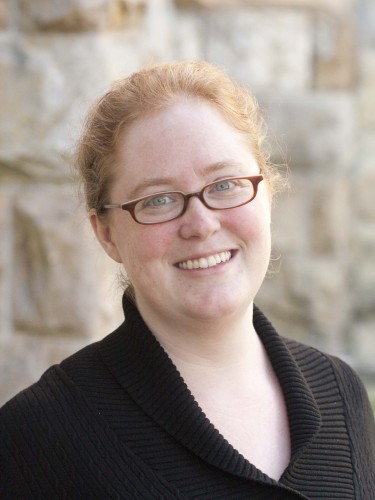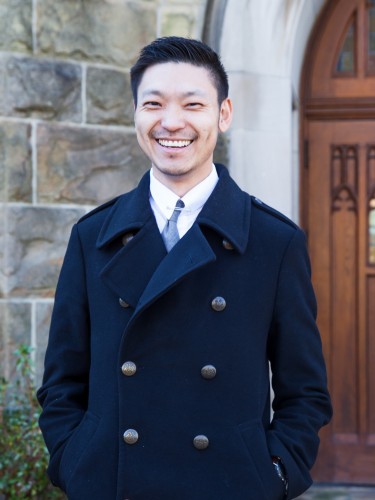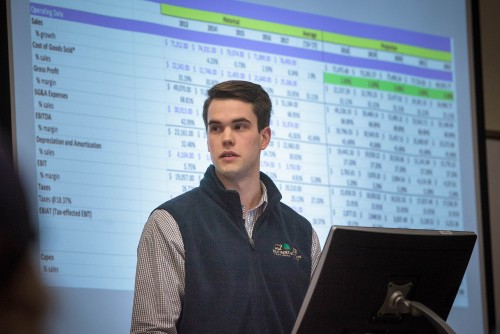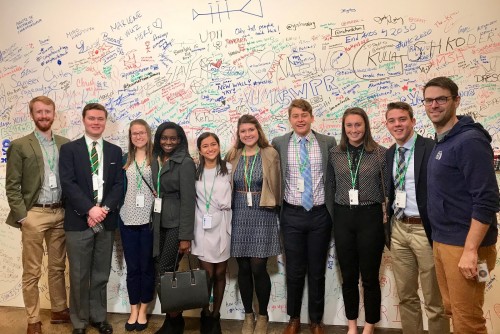Learn the analytical tools necessary to find answers to society's most pressing problems in areas such as pollution, inequality, immigration, discrimination, and growth.
WHY STUDY ECONOMICS AT SEWANEE?
If you want to analyze real-world data, study economic trends, and develop critical thinking, Sewanee’s economics curriculum could be the perfect fit for you. Sewanee’s faculty are uniquely positioned to introduce you to a broadened global perspective and provide skills that are highly valued in the workplace today.
Ask questions. Cultivate your own theories. Let the assortment of courses help you navigate those ideas. Economic activity—its development and operation, its ethics and trends, and its public and private institutions—invites investigation. From analyzing statistics to observing human behavior, the study of economics is a vital tool to understand the world.
FIRST DESTINATIONS: ECONOMICS MAJORS
Sewanee graduates secure positions in a variety of fields. Some you would expect, others are a bit of a surprise. Sewanee prepares you for your profession and your passion. Below is a sampling of recent graduates' first jobs.
- Research assistant, Federal Reserve Board of Governors, Washington, D.C.
- Analyst, BlackRock, New York, New York.
- Asset-Based lending analyst, SunTrust Robinson Humphrey, Atlanta, Georgia.
- Investment Banking Analyst, Greentech Capital Advisors, New York, New York.
- Technology analyst, Deutsche Bank, New York, New York.
- Trauma sales associate, Stryker Orthopaedics, Baton Rouge, Louisiana.
GRADUATE SCHOOL & PRE-PROFESSIONAL PROGRAMS: ECONOMICS MAJORS
Sewanee graduates enjoy extraordinary acceptance rates to top graduate and pre-professional programs–about 95 percent to law school and over 85 percent to medical school. Below is a sampling of where Sewanee grads continue their education.
- Ph.D. in economics, University of California at Santa Barbara.
- M.S. in mathematics, Washington University of St. Louis.
- M.S. in biostatistics, Harvard T. H. Chan School of Public Health.
- Management training/international thoroughbred racing and breeding, Darley Flying Start, Ireland.
- M.D. in medicine, Johns Hopkins University.
A Sampling of Courses
This course explores the economic causes and consequences of immigration. Importantly, it theoretically and empirically studies how the migration experience relates to the residents of both origin and destination countries. Topics include immigrant selection, assimilation, fiscal and labor market effects of immigration for the destination countries, and the consequences of brain drain for the source countries.
An introduction to the field of game theory—that is, study of strategic interactions in which participants take into account both the realized and anticipated behavior of other participants in determining their own behavior. Applications are drawn from the labor market, oligopoly, global politics, and everyday life.
Meet some professors

Katherine C. Theyson is an associate professor of economics, with a focus on the fields of international trade, development and environmental economics. The courses Dr. Theyson teaches include International Trade, International Finance, Health and Development and Econometrics. She is currently pursuing research on factors affecting the enforcement of U.S. environmental regulations.

Tao Song’s current research focuses on immigrants’ social-economic integration in the United States and the skill complementarity between immigrants and natives. He has also done research on other labor economic topics such as the labor supply and demand dynamics during the energy market booms and busts in Canada as well as the Chinese labor market fluctuations at the turn of the 21st century.
Contact
Katherine C. Theyson
Associate Professor of Economics
Carnegie Hall 115, Ext. 1146
News and Events
Marc St-Pierre & Aaron Elrod's Research Published in Journal of Public Economic Theory
Marc St-Pierre and Aaron Elrod recently published an article titled “The Perverse Effect of Environmental Regulation on Emissions: The Role of Product-Mix Changes” in Journal of Public Economic Theory. The authors construct a theoretical framework for understanding the relationship between environmental regulation and product mix, which is currently lacking in the literature. They then use this framework to identify general cases in which environmental regulation leads to an increase in emissions. Their findings provide practical policy implications for environmental regulatory agencies.
Brad Sturgill's Research Published in Structural Change and Economic Dynamics
Economics Alumni Serve as DataLab Instructors
Sewanee Economics Majors Take Their Next Steps
You might be interested in

Sewanee’s undergraduate research program gives students the opportunity to explore new ideas, sharpen their research skills, and get a head start on a career or graduate school. Almost a quarter of students here were involved in mentored research projects last year, in the sciences (of course)—but also in the arts, English, politics, and more. Students have the chance to wow their peers by giving talks and presenting posters during Scholarship Sewanee, the annual celebration of student scholarship and creativity.

Sewanee’s student investment club notches big returns for the University’s endowment—and for members’ postgraduate employment prospects. Sewanee entrusted club members with a sizable portion of its endowment. They took that capital and grew it by 67 percent in less than five years, consistently beating the market average. Not bad for a bunch of full-time students who happen to be part-time investors.

Business at Sewanee means you’re combining the best of a liberal arts education with on-the-ground learning opportunities. From internships to honors programs, you’ll learn a values-based ethical system, a broad knowledge of culture, interpersonal skills, and the ability to adapt to change. Leading M.B.A. programs and top CEOs believe a liberal arts curriculum is the best preparation for a successful career in business.

